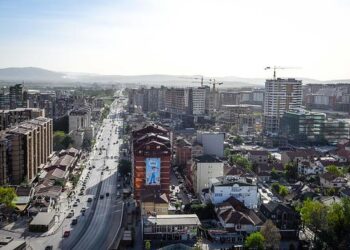Kosovo Prime Minister Albin Kurti has urged the European Union and NATO to impose sanctions on Serbia, accusing Belgrade of actively targeting ethnic Serbs in Kosovo. In a recent statement reported by Gazeta Express, Kurti emphasized the escalating tensions and security concerns stemming from what he described as Serbia’s hostile actions in the region. The call for international intervention highlights the deepening crisis in Kosovo and the ongoing challenges faced by the Western Balkans amid fragile inter-ethnic relations.
Kurti Urges EU and NATO to Impose Sanctions on Serbia Over Kosovo Conflict
Albin Kurti, the Prime Minister of Kosovo, has publicly urged both the European Union and NATO to implement decisive sanctions on Serbia amid escalating tensions in the Kosovo region. Kurti insists the Serbian government is actively engaging in hostile actions against Kosovar Serbs, which has raised significant security concerns. The Kosovo leadership emphasizes the urgent need for international intervention to deter further provocations and to uphold the sovereignty and stability of the region.
Key demands from Kurti’s administration include:
- Travel bans on Serbian officials involved in aggressive acts.
- Economic sanctions targeting Serbian enterprises linked to military or paramilitary activities.
- Diplomatic pressure to prevent escalation and promote dialogue under international supervision.
| Type of Sanction | Purpose |
|---|---|
| Travel Restrictions | Limit movements of Serbian officials |
| Asset Freezes | Target financial resources funding aggression |
| Trade Embargoes | Curb military supplies and economic support |
Allegations of Serbian Aggression Against Serbs in Kosovo Raise International Alarm
Albin Kurti, the Prime Minister of Kosovo, has intensified his calls for the European Union and NATO to impose sanctions on Serbia. He alleges that Serbia is actively engaging in hostile activities not only against Kosovo’s sovereignty but alarmingly, against the ethnic Serb community residing within Kosovo itself. Kurti’s accusations come amid rising tensions and a recent spike in violent incidents attributed to Serbian paramilitary groups and state-backed forces. The Prime Minister warns that if left unchecked, these actions could destabilize the fragile peace in the region and undermine international efforts aimed at reconciliation.
The international community is now urged to consider a multi-faceted response, addressing both security concerns and the protection of minority rights. Kurti insists that sanctions should specifically target:
- Serbian political leaders endorsing aggressive campaigns
- Paramilitary units operating across Kosovo’s borders
- Economic sectors funding military and paramilitary activities
Experts note that without decisive intervention, escalating violations could lead to a broader humanitarian crisis. The situation demands close monitoring, as geopolitical stakes rise in Europe’s most volatile corner.
| Entity | Alleged Activity | Potential Impact |
|---|---|---|
| Serbian Government | Political support for aggression | Diplomatic isolation, Sanctions |
| Paramilitary Groups | Cross-border incursions | Security destabilization |
| Ethnic Serbs in Kosovo | Victims of violence | Humanitarian crisis risk |
Calls for Targeted Measures to De-escalate Tensions and Protect Kosovo’s Stability
Albin Kurti, Kosovo’s Prime Minister, has urgently appealed to the European Union and NATO to impose targeted sanctions on Serbia amid escalating confrontations. He accused Belgrade of exacerbating instability by supporting Serbian factions within Kosovo, framing the situation as a direct threat to Kosovo’s sovereignty and the fragile peace in the region. Kurti emphasized that without decisive international intervention, tensions could spiral into open conflict, undermining years of diplomatic efforts.
In his statement, Kurti outlined several critical measures aimed at de-escalation and the protection of Kosovo’s territorial integrity:
- Implementation of targeted economic sanctions against Serbian officials linked to destabilizing actions.
- Increased NATO presence to ensure security and monitor border activities effectively.
- Enhanced diplomatic pressure on Serbia to cease interference in Kosovo’s internal affairs.
- Support for dialogue initiatives facilitated by the EU to resolve longstanding disputes peacefully.
| Proposed Measures | Expected Impact |
|---|---|
| Targeted sanctions on Serbia | Restriction of resources fueling unrest |
| NATO troop deployment increase | Strengthened border security |
| EU-led diplomatic talks | Possible peaceful resolution |
Wrapping Up
As tensions continue to escalate in the Balkans, Kurti’s urgent appeal to the EU and NATO underscores the growing international concern over Serbia’s actions in Kosovo. The call for sanctions reflects deepening fears of regional instability and the potential for further conflict. How the EU and NATO respond to this diplomatic challenge will be closely watched, with significant implications for peace and security in the Western Balkans.
















